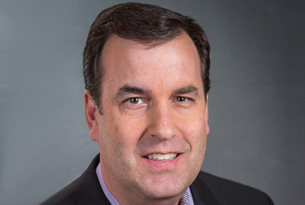ALEXANDRIA, Va. — Stacy Tetschner had been working at the Arizona-based National Speakers Association for 25 years when he decided to launch an informal job search earlier this year.

Tetschner, who had been CEO of the NSA since 1998, said he wasn’t actively looking for a new job, only “putting out feelers.”
That resulted in his receiving a variety of email notifications about openings in the association field, including one from the United Motorcoach Association seeking applicants for president and CEO.
“I kept getting emails about the UMA job and I kept deleting them,” Tetschner said. “I didn’t know anything about motorcoaches.”
Then one day he looked at a UMA email closer and thought, “This is interesting.” So he applied.
UMA’s board of directors apparently also found Tetschner interesting because it selected him from hundreds of applicants to take over as president and CEO, replacing Victor Parra, who retired at the end of March after 19 years at the helm of UMA.
“Stacy embodies the strong leadership and strategic vision that the board of directors was hoping for in our next chief executive,” said Dale Krapf, chairman of UMA and Krapf’s Coaches.
Tetschner started at UMA on June 5 after driving across the country with his 175-pound St. Bernard, Oso. (His family flew.)
He said was attracted to UMA because it is positioned for a great future and because the board is actively engaged in improving the association’s contributions to its members and to the success of the motorcoach industry.
“The board seems to want to get involved with setting strategy and turning it over to the team to implement that strategy for the benefit of members,” Tetschner said. “I was able to do that well at NSA and I’m looking forward to doing that here.”
Tetschner, 49, joined NSA in 1992 after a brief career as a restaurant manager and two years working in membership sales for the California Restaurant Association.
“I was trying to hone my sales skills and I became intrigued with the whole association world,” he said. “It was a great transition to the association industry.”
Tetschner’s first job at NSA was as membership and chapter relations manager. At the time the association, whose members are professional speakers, was undergoing major changes, including doubling its dues, and he was charged with growing membership.
Tetschner later was promoted to a job helping develop a new conference center at NSA. Then, only six years after he joined the association, there was a leadership shakeup that resulted in the hiring of a new CEO. However, she only lasted 90 days on the job.
Tetschner said he felt at the time that he was qualified to do the job, but the board thought that at 30 years old he was too young. But the board decided to give him a chance and offered him a one-year contract to head NSA, after which his performance would be evaluated.
“They liked what I was doing and I loved what I was doing,” Tetschner said, so he was promoted to CEO. “It was a pretty rapid advance, but I was at the right place at the right time.”
During Tetschner’s tenure as CEO, NSA improved the quality of its educational programs for its 3,500 members and generally raised the professionalism of the organization. Member communications also were improved with the development of a magazine, podcasts and videos.
“We established metrics to build speaking careers and got professionals to come together and build a support structure,” Tetschner said. “It’s all about helping members make more money.”
He said he also plans to work on developing more educational programs at UMA, improving communications and engagement with members, and “getting the word out about the good stuff we do. And the good stuff we do is the best there is. We’re delivering benefits at the highest level.”
Tetschner also can leverage his connections in the trade association world and the convention and meetings industry. He is an active member of the American Society of Association Executives, where he has served on the board and as vice chairman of ASAE and the Center for Association Leadership. He also has served as chairman of the board and as a director for the Convention Industry Council.
Tetschner said his philosophy on running a trade association is an outgrowth of his relationship with his youngest son, Raymond, a Native American child who has Down syndrome.
Tetschner and his wife, Michelle, adopted Raymond after serving as his foster parents. They also have two other sons, ages 23 and 26.
The couple read all the books they could find about Down syndrome but “didn’t find anything positive,” Tetschner said.
So they decided to publish their own book, “Windows Into Heaven: Stories Celebrating Down Syndrome,” a compilation of positive stories they gathered and edited.
“Native Americans believe that people with Down syndrome and other disabilities have a special window to the Great Spirit,” Tetschner said. “That’s why the book is titled ‘Windows Into Heaven.’
“I see things through Raymond’s eyes and that has affected my view of associations. We have to understand that not everyone has to be the same. We have to value different approaches,” he said.
“Associations exist to serve all members, not just the ones who do things a certain way.”




